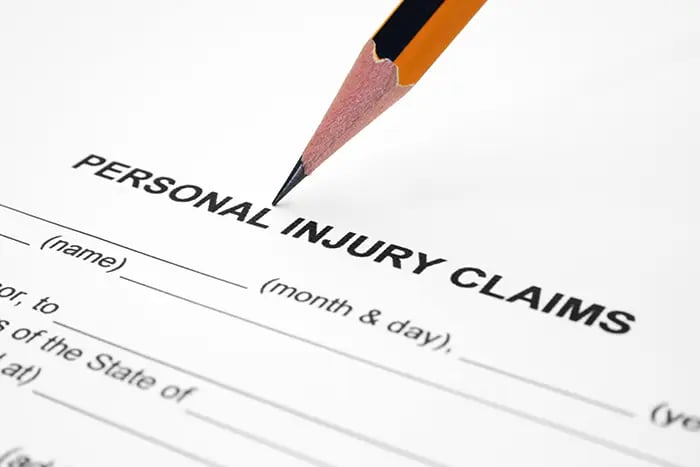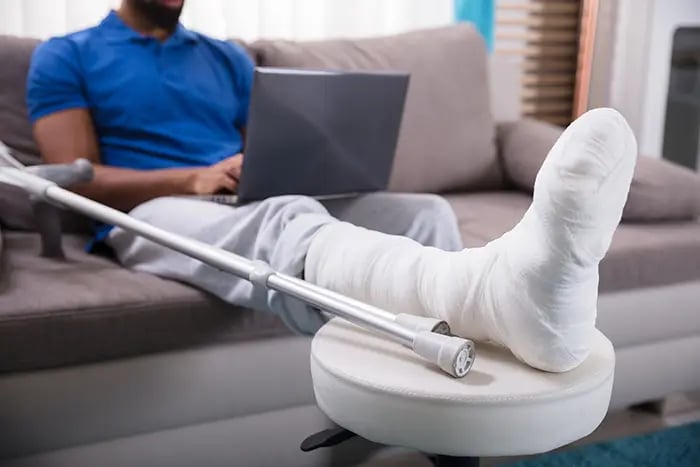2 min read
Virginia Court Reversed Dismissal of Wrongful Death Claim
Wrongful death action following medical treatment in multiple states
Lewis Darnell Green, as personal representative of...
In the U.S., hundreds of millions of dollars are paid out every year by insurance companies, corporations, and governments to settle personal injury cases just like yours. Personal injuries can result in not only physical, emotional, and mental injuries to a person, but also potentially catastrophic financial hardships, including medical bills, personal and living expenses, and a permanent disability condition. Not only can individuals seek personal injury claims for themselves, but claims can be filed on behalf of a family member or a loved one. In order to be eligible for a personal injury claim, you must prove someone else is responsible for your or your family member’s injuries. This can be challenging and is often time-consuming, especially when having to navigate insurance company red tape.

Some of the most common types of personal injury claims are:
Although most people think personal injury claims only pertain to physical injury, personal injury claims can also arise from non-bodily harm such as:
At Whitcomb Selinsky, PC, we have a dedicated team of senior attorneys, headed by Nathan J.D. Veldhuis in Virginia and Washington, DC, ready to represent you and your personal injury claim. We will take on the insurance companies, collect the necessary evidence to identify your injuries and identify the responsible party for the injuries, and file your claim for compensation. Our team will handle your claim with the care and attention it deserves.
If we are successful on your personal injury lawsuit, you will be awarded monetary damages for your injuries. These damages are meant to compensate you for your loss and may include:

To file a personal injury claim, you need to prove that someone else is responsible for your or your loved one's injuries. This process involves gathering evidence, identifying the at-fault party, and navigating the insurance company's procedures. Consulting with an experienced personal injury lawyer can streamline this process and ensure that your claim is handled with the care and attention it deserves.
When choosing a personal injury attorney, look for experience and expertise in handling similar personal injury cases. It’s important to find an attorney who has a proven track record of successfully settling and litigating personal injury lawsuits. Additionally, consider seeking a free consultation to discuss your case and assess the attorney’s approach and compatibility with your needs. You should also inquire whether the firm operates on a contingency fee basis, meaning you only pay legal fees if they win your case.
Personal injury lawsuits can be lengthy and involve several stages:
Discovery: Both parties exchange information relevant to the case, such as medical records, witness lists, and expert reports. This stage can be time-consuming but crucial for building your case.
Depositions: Witnesses provide sworn testimony under oath, which is recorded and can be used later at trial.
Negotiations: Throughout the process, your attorney may attempt to negotiate a fair settlement with the at-fault party's insurance company. This could avoid the need for a trial and provide you with peace of mind.
Trial: If a settlement cannot be reached, the case will go to trial. Here, a judge or jury will hear arguments from both sides and decide on liability and damages.
Damages refer to the losses you suffered due to the injury. These can be categorized into two main types:
Economic Damages: These are quantifiable losses with clear dollar amounts attached. Examples include medical care costs, lost wages due to missed work, rehabilitation costs, and property damage.
Non-Economic Damages: These are intangible losses that can be more difficult to quantify. They may include pain and suffering, emotional distress, loss of enjoyment of life, and loss of consortium (impact on marital relations). Your attorney will work to secure fair compensation for these types of damages.
There are two main categories of damages that can be awarded in a personal injury case:
Compensatory Damages: These damages are intended to compensate you for the actual losses you suffered due to the injury. This includes all the economic and non-economic damages mentioned previously.
Punitive Damages: These are awarded less frequently and are intended to punish the at-fault party for egregious conduct or reckless disregard for safety. Punitive damages are not meant to compensate you for your losses but rather to deter similar behavior in the future.
Not all personal injury cases qualify for punitive damages. Your personal injury law firm can advise you on the likelihood of punitive damages being awarded in your specific case.
It's crucial to remember that missing the statute of limitations deadline can significantly impact your ability to pursue compensation through the court system. If you believe you have a personal injury case in Colorado, consult with an attorney as soon as possible to understand the relevant deadlines and ensure you file your claim within the appropriate timeframe.
Colorado follows a modified comparative negligence system for personal injury cases. This means that the amount of compensation you receive can be reduced based on the percentage of fault attributed to you. Here's how it works:
Your recovery will not be barred as long as you are found to be less than 50% at fault for the accident.
The percentage of fault you share will be directly deducted from your total compensation award. For example, if you are found 20% at fault and your total damages amount to $100,000, you would receive $80,000 (100% - 20% = 80%) in compensation.
It's important to note that some complex legal issues might exist depending on the specific circumstances of your case. Consulting with a personal injury attorney familiar with Colorado's comparative negligence laws is highly recommended to understand how fault attribution might affect your potential compensation.
You can potentially sue any party whose negligence caused your injury. Here are some common examples:
Drivers: In auto accident cases, you can sue the driver at fault for causing the collision.
Property owners: If you slip and fall on someone's property due to a dangerous condition they knew about or should have known about, you may be able to sue the property owner.
Product manufacturers: If you're injured by a defective product, you can potentially sue the manufacturer, distributor, or retailer of the product.
Medical professionals: In cases of medical malpractice, you can sue a doctor, nurse, or other healthcare provider whose negligence caused you harm.
This list is not exhaustive, and anyone whose actions or inaction led to your injury could be a potential defendant in your personal injury lawsuit. Your legal team will help you determine the appropriate parties to sue based on the specifics of your case.
To win a personal injury case, you typically need to prove the following elements:
Duty of Care: The negligent party owed you a duty to act in a reasonable way to avoid causing you harm. (e.g., a driver has a duty to operate their vehicle safely)
Breach of Duty: The defendant breached their duty of care by acting negligently or unreasonably. (e.g., a driver ran a red light)
Causation: The defendant's breach of duty caused your injury.
Damages: You suffered damages (economic and/or non-economic) as a result of your injury.
The burden of proof lies with you, the plaintiff, to establish these elements by a preponderance of the evidence, meaning it's more likely than not that your version of events is true.
Legal liability refers to who is responsible for your injury. In personal injury cases, you need to establish the other party's liability to hold them accountable for the damages you suffered. This involves proving the elements mentioned above (duty, breach, causation, damages). An attorney can help you navigate the legal complexities of establishing liability in your case.
Some of the most common bodily-harm personal injury cases are:
Although most people think personal injury claims only pertain to physical injury, personal injury claims can also arise from non-bodily harm such as:
At Whitcomb Selinsky, PC, we have a dedicated team of senior personal injury attorneys, headed by Nathan J.D. Veldhuis in Virginia and Washington, DC, ready to represent you and your personal injury lawsuit. We will take on the insurance companies, collect the necessary evidence to identify your injuries and identify the at-fault party for the injuries, and file your claim for maximum compensation. Our team will handle your claim with the care and attention it deserves.

Nathan has spent his entire career representing people and/or family members and friends of accident victims who have been injured or killed through no fault of their own. Nathan has worked on cases from “fender benders” to major catastrophic injuries caused by the negligence of other people, corporations, or the state and/or federal government. His compassion for his clients gives Nathan a better understanding of those who have experienced, or are experiencing, difficulties due to their injuries.

Nathan specializes in civil litigation. He has a passion for helping clients navigate complicated aspects of litigation. Nathan works closely with clients to guide them through their cases, ensuring their understanding of the complex rules and laws.
Get Started in
 Discuss Your Claim
Discuss Your Claim  Explore Your Options
Explore Your Options  We Will Advocate For You
We Will Advocate For You


Jun 30, 2025 by Joe Whitcomb
Lewis Darnell Green, as personal representative of...
May 31, 2025 by Joe Whitcomb
In Mathura v. Makaryus, the New York Appellate Division reversed a lower court's decision and dismissed medical...
May 24, 2025 by Joe Whitcomb
In Fabiano v. Philip Morris USA Inc., the Massachusetts Supreme Judicial Court considered whether a personal...
Colorado
300 Union Boulevard
Suite 200
Lakewood, CO 80228
(303) 534-1958 (local)
© 2025 · All Rights Reserved · Whitcomb, Selinsky, PC